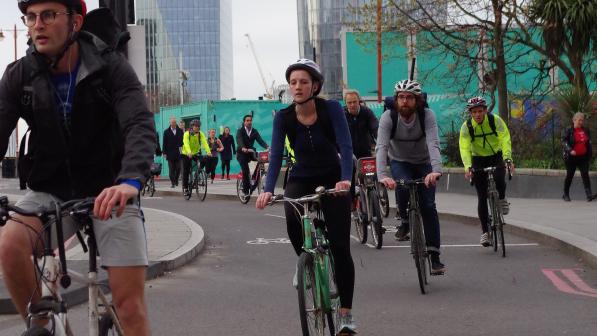Government in serious danger of missing cycling and walking targets, say leading charities
Giving evidence to the House of Commons Transport Committee inquiry into Active Travel, Cycling UK, Sustrans and Living Streets urged the Government to make a significant increase in investment in active travel to address a public health crisis.
The Government’s Cycling and Walking Investment Strategy (CWIS), published in 2016, sets out to double the number of cycling trips by 2025, with similar aims to increase walking, particularly for school journeys.
However, in a safety review document to support the strategy, published last November the Department for Transport admitted its current policy would only see cycling increase by a third over the next six years.
The Government has set an ambition in the CWIS of getting 55 per cent of primary school children walking to school by 2025. This is an important recognition of the benefits of getting children walking to school. However, last year the figure dropped from 53 per cent to 51 per cent.
The charities recognise Transport Minister Jesse Norman’s push to strengthen the Government’s Cycling and Walking Investment Strategy; but a very significant funding boost is still needed if the Government’s ambition, for walking and cycling to become the normal choices for short journeys, is to be realised.
Only two percent of total transport spending is on cycling and walking. Cycling UK, Living Streets and Sustrans say this should rise to at least five percent by 2020, and 10 percent by 2024, with a large proportion of this allocated to support local authorities’ plans to increase cycling and walking.
Without this increase in funding, and more cross-departmental working, the role of cycling and walking as outlined in the Government’s strategies to address the obesity epidemic and air pollution will be limited.
Roger Geffen, Cycling UK’s policy director, who gave evidence to the committee said: “Cycling is a miracle pill that can cure a lot of the ills this Government is facing with air pollution and the physical health problems associated with inactivity.
“However, by its own admission the Government is not going to meet its own modest targets to double cycling, which Cycling UK believes is due to inadequate funding. Cycling UK believes Government should rebalance its spending to local solutions to car dependence.
“It’s not the people currently cycling who will benefit from more funding, but rather those who feel forced to drive those short distances to school, work or the shops due to having no suitable alternative.”
Joe Irvin, Chief Executive of Living Streets said: “Enabling more people to walk and cycle everyday journeys can hugely improve our health, air quality, traffic congestion and road safety. Government need to invest to make this happen.
“In particular the government needs to encourage and enable more children to walk to school, or it will fail to meet its own target of 55% of primary school children walking to school by 2025.”
Rachel White, Senior Policy and Political Advisor for Sustrans, the walking and cycling charity said: “We welcome the UK Government’s work on walking and cycling in England to date. The Government now needs to up its game on the low cycling levels and the decreasing numbers of children walking to school.
Physical inactivity, air pollution, climate change and struggling high streets can all be reduced through the provision of high quality infrastructure such as a network of protected cycle lanes and pedestrianisation of our shopping centres.
This requires sustained, long-term investment in cycling and walking but we need real cross departmental leadership and investment now to make the change. Additionally, any increase in funding nationally must be matched with a commitment to delivery at a local level.”
Cycling UK and Living Streets are running a joint campaign, supported by Sustrans, urging the Government to allocate more funding to authorities devising plans to encourage cycling and walking.
ENDS
Notes to editors
- Cycling UK, the national cycling charity, inspires and helps people to cycle and keep cycling, whatever kind of cycling they do or would like to do. Over a century’s experience tells us that cycling is more than useful transport; it makes you feel good, gives you a sense of freedom and creates a better environment for everyone. www.cyclinguk.org
- Total current and planned investment in walking and cycling (from both central and local sources) over the period 2016/17 to 2019/20 now amounts to around 2% of total transport spending in England (excluding London) over that period.
- The Government’s Cycling and Walking Investment Strategy, published in 2017, set out an ambition “to make cycling and walking the natural choices for shorter journeys, or as part of a longer journey”, with “more people hav[ing] access to safe, attractive routes for cycling and walking by 2040.” It included objectives to increase cycling and walking journeys (and specifically to increase walking journeys to school) by 2020 along with reductions in the rate of fatal and serious injuries on our roads. It also set aims for increases in both cycling and walking (including walking for school journeys) by 2025, which included an aim to double cycling ‘stages’ (where a ‘stage’ can be a trip or part of a longer trip that also involves public transport), from 0.8 billion to 1.6 billion ‘stages’.
- The Government’s subsequent response to its Cycling and Walking Investment Strategy Safety Review notes (at paragraph 2.8) that “Current policy is projected to fill around one third of the gap towards 1.6 billion cycle stages”. This is cited as a finding of a study, commissioned by Government from the consultancy Transport for Quality of Life, into the funding needed to assess the impact of current investment on levels of cycling and walking (including walking to school) and the additional investment needed to meet the aims and targets of the CWIS. See www.parliament.uk/business/publications/written-questions-answers-state… .
Press contact information
For more information contact the national Cycling UK Press Office on 01483 238 315, 07786 320 713 or email [email protected]
Kathryn Shaw, Communications and Media Manager, Living Streets on 020 7377 4914 / 07545 209865 / [email protected]
Anna Galandzij in the Sustrans Press Office on 07910 559739 or email [email protected]

